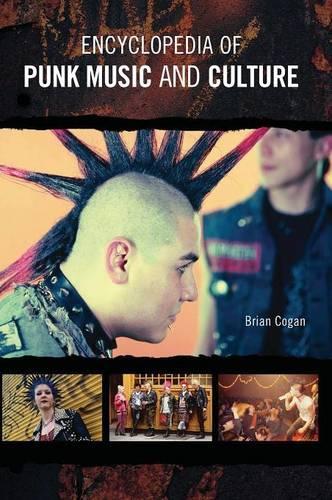
Encyclopedia of Punk Music and Culture
(Hardback)
Publishing Details
Encyclopedia of Punk Music and Culture
By (Author) Brian Cogan
Bloomsbury Publishing PLC
Greenwood Press
30th May 2006
United States
Classifications
General
Non Fiction
Popular culture
Encyclopaedias and reference works
782.421660922
Physical Properties
Hardback
312
Width 178mm, Height 254mm
822g
Description
Although its origins and definition are hotly debated among scholars and fans alike, punk rock music has an ever-evolving but always loyal fan base. The British punk movement is thought to have begun in the mid-1970s with bands such as the Clash and the Sex Pistols, and the American punk movement in the early 1970s with bands such as the Ramones, Patti Smith, and Television playing at CBGB's in New York City's Lower East Side. The punk subculture continues to evolve today, with new bands, fashions, politics and zines embodying the spirit of its founders while also influencing mainstream culture. This inclusive encyclopedia chronicles the history and development of punk, including sub-movements such as Hardcore, Post-punk, Queercore, and Emo, to provide readers with an extensive overview of the music, fashion, films, and philosophies behind it. Entries for musicians include a discography for those wanting to start, or develop, their music collections. Entries include: Advertising; Anarchy; David Bowie; CBGB's; The Clash; Movement; Drugs; Flyers; Gender and punk; Hardcore; London; The Ramones; Johnny Rotten; Malcom McLaren: The Sex Pistols; Sid Vicious; Straight Edge and Vivienne Westwood.
Reviews
Cogan draws on his long-term involvement with punk culture as writer and musician to create this broad-based, up-to-date guide to the performers, publications, labels, venues, and terminology of punk. The more than 600 entries are alphabetically arranged, and can also be found via a topical guide and analytical index. . . . The work's strength is the analytical discussion of styles (e.g., emo, hardcore, straight edge); city scenes; gender, sexual, and political issues; and influences (e.g., reggae, rockabilly, Captain Beefheart), with coverage inclusive of 1960s protopunk through each evolution of the following 40 years. . . . Recommended. All levels. * Choice *
Longtime punk fan, journalist, and academic Cogan takes a highly catholic approach to what is and isn't punk, opting not to restrict the movement to a particular locale or time period. He tries to cover nearly every important band, taking in all manner of subgenres from hardcore to oi with an octopuslike reach. . . . [F]or academic and large public libraries. * Library Journal *
[A] fascinating overview of the punk world from its origins in the early 1970s until the present day. Written from the perspective of an insider, writing about outsiders, this is a considerable and comprehensive resource that well captures the spirit and influence of punk and its manifold cultures and subcultures. . . . It should prove a really good starting point for undergraduates across a range of disciplines from musicology to cultural studies, social history to subcultures. . . . Cogan's deep understanding of his subject is reflected in the excellent cross-referencing. The book also presents an interesting counterpoint to the modern music culture of downloads, MTV and MySpace. . . . It is a highly enjoyable, accessible overview and introduction of what is a fascinating and individualistic way of life. * Reference Reviews *
Recommended for comprehensive research collections and collections with a significant popular culture emphasis. * Reference & User Services Quarterly` *
Brian Cogan captures the spirit of punk music and culture in his detailed descriptions of various bands, songs, genres, and records. Frequently noting musical influences and professional relationships, Cogan succeeds in conveying the contemporary feelings of excitement and experimentation surrounding the movement. In the process, he explores the clubs and locations that set the early scene for the music, the record labels and leading spirits who set the tone for punk culture, as well as the fanzines, books and films that have helped keep the movement alive. Also examined are the relationship of punk to drug use, fashion, parents and politics. Needless to say, Cogan views punk culture as an active development, and he demonstrates it continuing influence in the likes of Fugazi, the Riot Grrrl movement, and Green Day. With nearly 600 entries and selected discographies, this entertaining guide is certain to find an audience in high school, public and academic libraries. * Lawrence Looks at Books *
For any reader with an existing interest in punk . . . there will certainly be some appeal, since the author provides a good deal of very obscure information alongside detail concerning all the most well-known punk acts. * Journal of Popular Music *
Author Bio
Brian Cogan is a writer and professor who has written extensively on music and popular culture as well as music criticism. He received his PhD in Media Ecology in 2002 from New York University. He teaches at Molloy College and has taught at New York University and the College of Staten Island. Cogan has been a member of the punk scene for over 20 years and has written for a variety of zines as well as journals, newspapers, and magazines and has performed and recorded with his band In Crowd since 1987.
